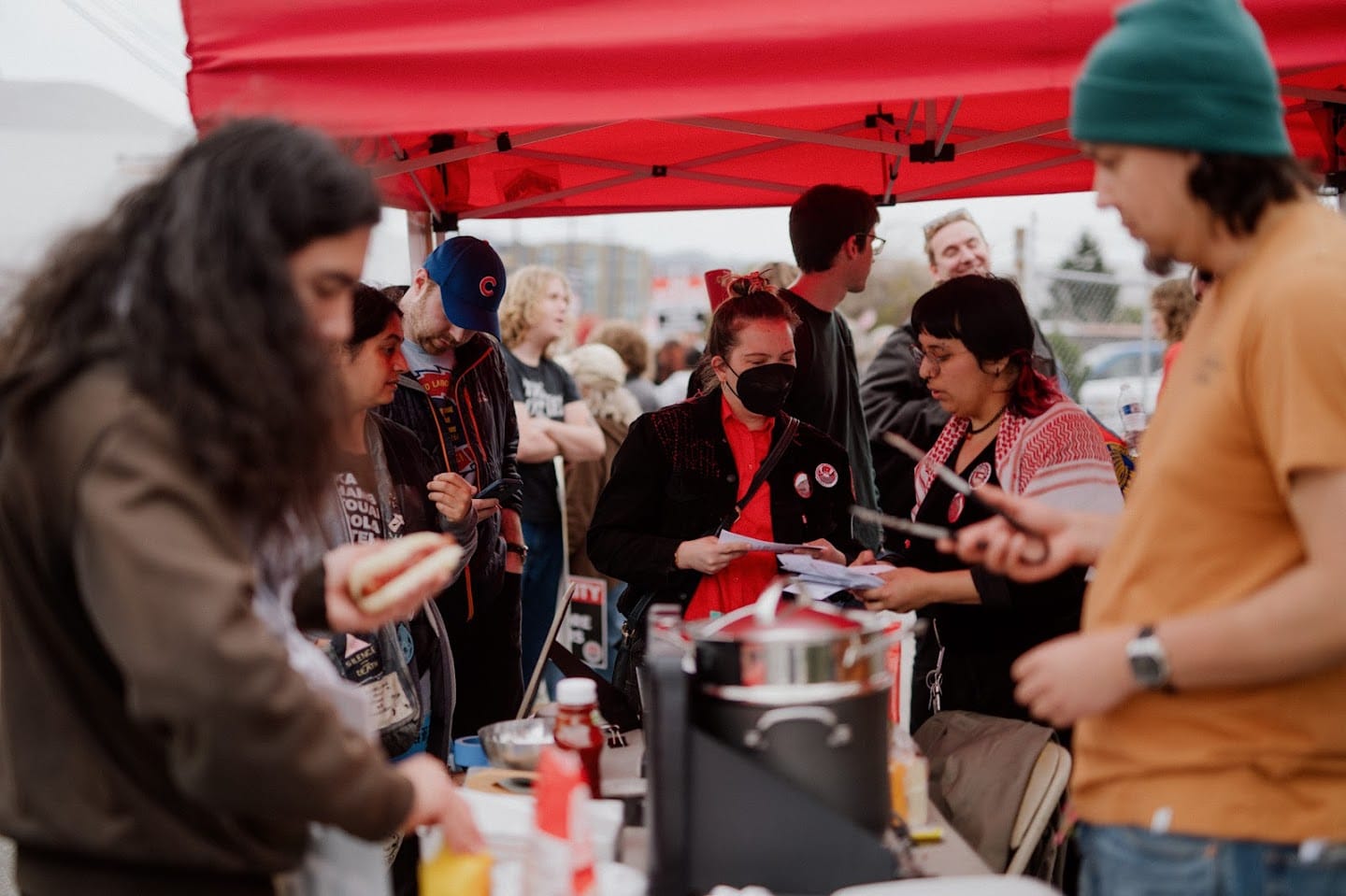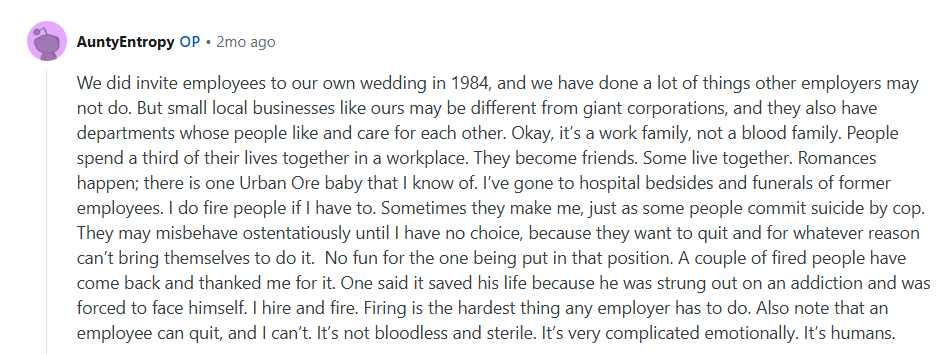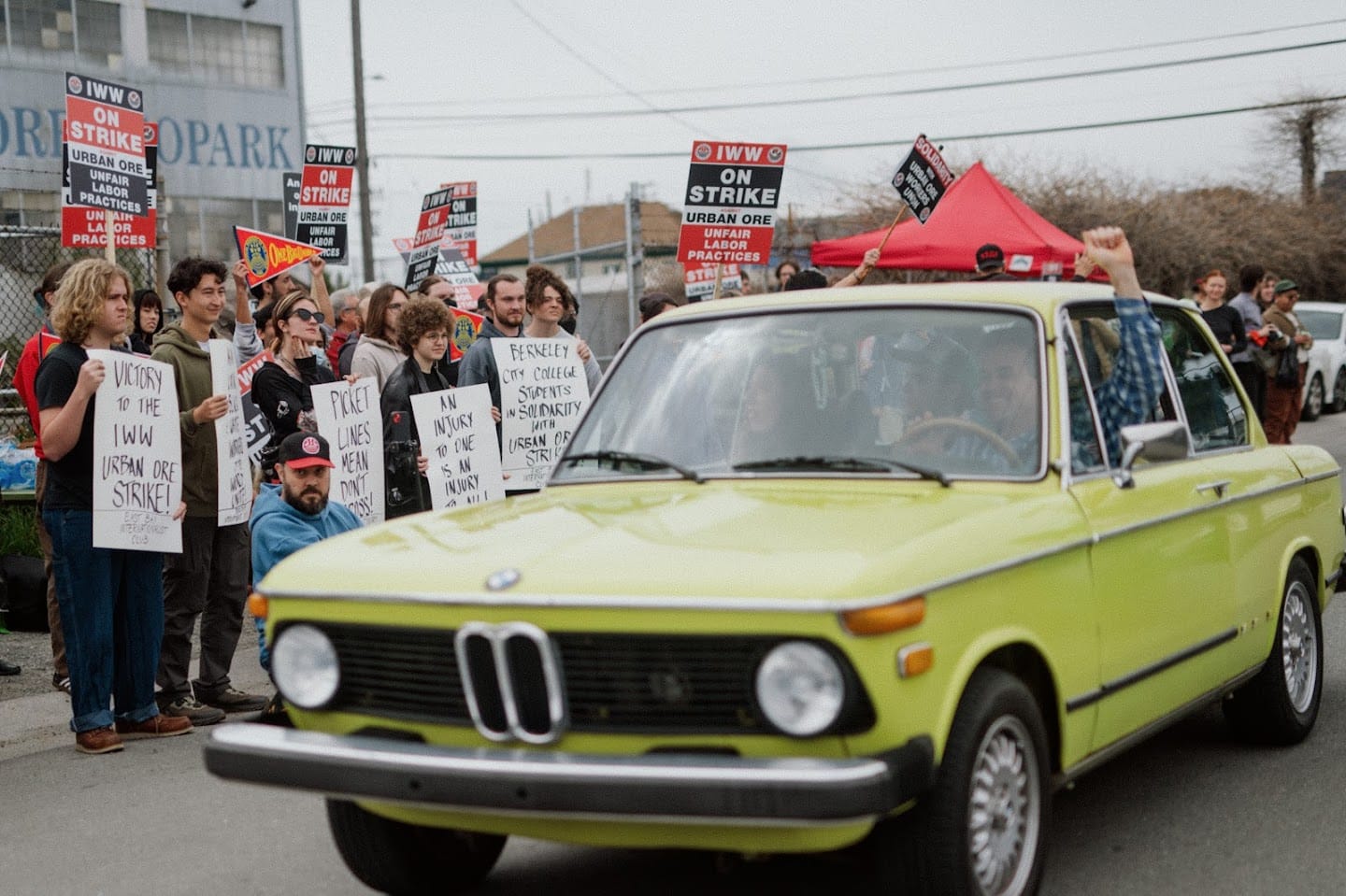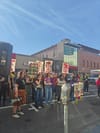“It Starts with Being Human”: Inside the Strike at Urban Ore
Forty days on strike led to major wins for Urban Ore workers, but the struggle for a first union contract lies ahead.

How can you get a raise at work, and get your boss to make concessions to a newly formed union? Workers at Urban Ore, a three-acre salvage yard and general store in Berkeley, have shown one way. It took 40 days (and 40 nights), but on May 1 the Urban Ore Union ended its strike with a number of victories.
Urban Ore is a Berkeley-based small business and scrapyard whose stated mission is to “end the age of waste.” Urban Ore workers say their willingness to fight to improve their jobs is rooted in their dedication to that mission, and a belief that collectively demanding more from management is worth the resulting stress and challenges — not just for themselves, but for the chance of inspiring other workers. They’ve demonstrated an ability to fight over the long haul — whether six weeks on strike or two-plus years at the bargaining table.
Urban Ore is not alone. It’s one of a group of local businesses where workers have unionized in recent years, including Good Vibrations, Highwire Coffee Roasters, the Oakland Museum of California, Philz Coffee, Half Price Books, and local branches of Starbucks, Peet’s Coffee, Barnes and Noble, and Trader Joe’s. But so far only Urban Ore workers have made the decision to go out on strike.
Why? After unionizing in 2023, workers say years of bad faith bargaining from owners Daniel Knapp and Mary Lou Van Deventer set the stage for the strike this spring. With daily pickets in front of the store, the strike played out as an open battle between workers and owners.
“It was becoming quite obvious the intention was for the company just to negotiate things until we went away,” said Benno Giammarinaro, a four-year employee and member of the Urban Ore Union bargaining committee. “We’re trying to demonstrate that even if you are a smaller union you can still organize effectively.”
By the end of the strike, workers had won an immediate raise, reduced volatility in pay, and an agreement to rehire laid-off workers once the business hits certain financial benchmarks. In exchange they agreed to a 45-day “cooling off period” with management to try to reach a final deal on a first contract. That period has now passed, and bargaining is ongoing.
“I found myself feeling pretty grateful and proud that most people in the East Bay have the strength of conviction not to cross a picket line,” said Spencer Jordan, who has been working at Urban Ore for three-and-a-half years as a salvager.
“I found myself feeling pretty grateful and proud that most people in the East Bay have the strength of conviction not to cross a picket line,” said Spencer Jordan, who has been working at Urban Ore for three-and-a-half years as a salvager. “A lot of people who are supportive also feel a little bit of hope at seeing other people in the working class exercise their power. And that’s part of what the strike means to me.”
Deciding to Strike
While union members love Urban Ore and its mission, there’s been no love lost between the Urban Ore bosses and the union. Owners Knapp and Van Deventer initially refused to recognize the union when workers organized with the Industrial Workers of the World (IWW) in 2023, instead demanding that workers vote in an election. The workers won the election vote 14 to 7, despite what workers described as an effort to discourage unionization by ownership (in written statements to Current, Knapp and Van Deventer both denied running a campaign to get workers to vote no in their union election).
“In the union’s election, the union published various pieces of persuasion to convince people to vote for the union,” said Van Deventer in a written statement to Current, “We countered a couple of those to correct facts but didn’t make arguments of persuasion against unionizing or the union.”
Even after the initial election fight, workers were hopeful they could reason with Knapp and Van Deventer and secure a first union contract through focusing on the bargaining table, according to bargaining team members.
“We spent the first year of bargaining playing the nice guy game and really making bargaining itself our biggest focus,” said Sarah Mossler, who’s worked at Urban Ore for five years and is also a member of the bargaining team. “At the beginning of the second year of bargaining, we brought them all our economic proposals at once. That’s when the bad faith bargaining really started getting bad. They had to start stalling because we had everything written out.”
An information war with the company’s owners kicked into high gear, workers say. Bargaining committee members started to realize a strike might be their only option.
“There’s hope we don’t have to go on strike, right? The bargaining committee gave the owners so many chances to come to the table— they just weren’t listening,” said Evelyn Garcia, a picket captain who’s worked at Urban Ore for a year-and-a-half.
“The bargaining committee gave the owners so many chances to come to the table— they just weren’t listening,” said Evelyn Garcia, a picket captain who’s worked at Urban Ore for a year-and-a-half.
Workers on the picket line expressed that community support, trust in each other, and faith that fighting their boss could lead to meaningful victories enabled Urban Ore workers to go out and stay out on strike. Prior to the strike, the union secured years of back pay for workers due to wage law violations, which further built confidence that their union could produce major wins. A successful fundraiser organized with support from the Democratic Socialists of America’s (DSA) East Bay Workplace Organizing Committee, which helps local workers organize and win unions at their workplaces, also boosted their confidence. (Current is fiscally sponsored by East Bay DSA. We maintain full editorial independence.)
Workers also shared stories of retaliation from management, with at least two active members of the union fired since 2023. Van Deventer has denied firing anyone for union activity. “Our longstanding practice as an at-will employer has been to terminate people’s employment only for egregious actions or for patterns of misbehavior that continue after oral and written warnings,” she wrote in a statement to Current.

But even in the face of years of disrespect, the vast majority of American workers, even the vast majority union members, never go on strike. In recent years, however, the number of workers taking strike action has risen. Around 271,000 workers went on strike in 2024, a significantly higher number than in the 2000s and 2010s, according to research from the Economic Policy Institute.
How did Urban Ore workers build the solidarity required to wage a six-week strike? Strikers stressed the importance of meaningful relationships.
“It starts with being human,” said Urban Ore worker Spencer Jordan on the sixth day of the strike. “All of us in the workplace know we have each other’s backs, we chat, we talk about each other’s lives, we play baseball and all that shit together.”
The Boss’ Response
Once the strike began, Urban Ore owners Knapp and Van Deventer tried to rally public sympathy for their perspective on negotiations, giving interviews to local publications. Van Deventer even took the unconventional step of heading to online discussion forum Reddit to plead her case to the general public under the name “AuntyEntropy”.
Van Deventer’s posts covered a wide range of topics, including her meditations on firing (“I do fire people if I have to. Sometimes they make me, just as some people commit suicide by cop”), the role of community support on the picket line (“some or all are paid”), her own conduct at the table (“sometimes I get cranky”), and her lack of familiarity with key aspects of labor law (in response to allegations that Urban Ore management failed to send representatives with authority to bargain, she replied, “I’m not sure what ‘bargaining power’ means or why it’s important”).


Workers on strike were left wondering why Van Deventer had time to post so extensively on Reddit but not to return to the bargaining table and hammer out a fair contract.
“One of the owners has been going on about how we’re all one big family. I don’t think she even knows my name. I can count on both hands the amount of times before the strike that she’s shown up to Urban Ore,” said Garcia. “They made $3.5 million in revenue last year. After taxes, I make a little over $36,000. I think the strike is showing that they need us more than we need them.”
Life on the Picket Line
Urban Ore workers kicked off their strike in style, with a rally and speeches from fellow IWW members from Peet’s Coffee and a variety of community organizations, including the East Bay Democratic Socialists of America.
“The first day was an instant confidence booster, seeing how much support we had. I think everyone felt some sort of relief seeing that. Our resolve has just gotten stronger because we have each other’s back,” said Garcia.

Even with that initial excitement, the reality of an open-ended strike quickly settled in.
“I’m just hoping for change, honestly,” said Panda RF, who’s worked at Urban Ore for two years, on the fourth day of the strike. Being out on the line, “is scary. I’m not going to lie to you, I’d rather not be striking, but you know what? I’m here to fight, you know? It’s been cool, all the support from the regulars.”
“I’m just hoping for change, honestly,” said Panda RF, who’s worked at Urban Ore for two years, on the fourth day of the strike. Being out on the line, “is scary. I’m not going to lie to you, I’d rather not be striking, but you know what? I’m here to fight, you know? It’s been cool, all the support from the regulars.”
Goals for the strike centered around immediate gains for the workers and winning a fair contract, but also ranged beyond the walls of Urban Ore. Strikers expressed a desire to demonstrate to other Bay Area workers the power and possibility of getting organized on the job — whether at a large corporation, like the unionized Peet’s Coffee workers who often joined their Urban Ore union siblings on the picket line, or a small business or local nonprofit.
“We talk to a lot of workers that are organizing, bargaining their first contracts, and the atmosphere of hostility to the rank-and-file in small businesses and large corporations alike is one that can only be addressed through taking action,” said Giammarinaro. “We’re trying to demonstrate that even if you are a smaller union you can still organize effectively.”
The dire national political situation provided extra motivation for workers to stand up for themselves. For Urban Ore worker Jordan. “[The strike] is a sign that we can come together and resist in ways that are beyond electoral politics or begging for scraps from our bosses or scabbing.”

What Comes Next
Five striking workers were laid off before workers forced management back to negotiations. Rumors that the business was on the verge of shutting down fueled fear of permanent job loss and hope that management would make an offer good enough for workers to call off the strike.
Finally, on May 1st — International Workers’ Day and 40 days into the strike — the Urban Ore Union announced an end to the strike, at least for now. Workers had secured a number of victories, in exchange agreeing to a 45-day “cooling off period” with management to try to reach a final deal on a first contract, which has now passed. Union members will be keeping an eye on whether management honors an agreement to rehire the laid off workers.
“It was really tricky to navigate the real possibility of people losing their jobs if the employer shut down,” said Giammarinaro. “We proved we can win a strike even in the face of a legitimate threat of closure.”
Now, the challenge is to see if workers can force Urban Ore to negotiate a fair contract — if not, the ability to go back out on strike is always on the table.





